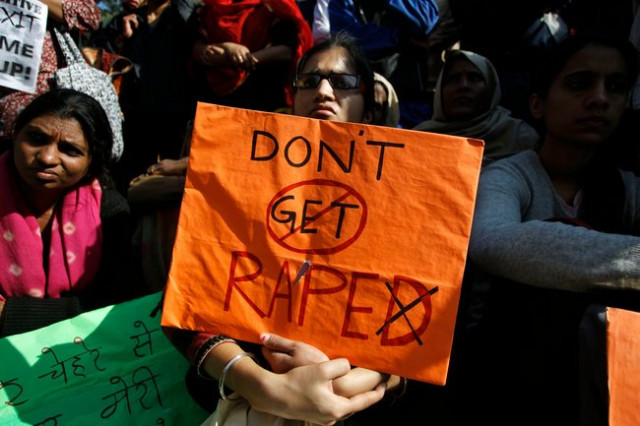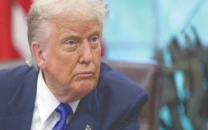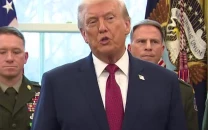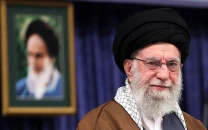Ban on Delhi gang-rape documentary stirs fierce debate in India
Victim's father and renownded poet and MP Javed Akhtar demand ban on documentary be lifted

PHOTO: AFP
A day earlier, an Indian court banned the country’s media from broadcasting the BBC documentary India's Daughter in which one of the men who raped and murdered a New Delhi student is shown blaming the victim. The Indian parliament, however, was split over the decision on whether to allow the viewing or not.
Read: India bans broadcast of gang-rapist documentary
As Home Minister Rajnath Singh said in the Rajya Sabha (uppher house of the Indian Parliament) that a restraining order had been obtained against the screening and called for a probe as to how the rapist was allowed to be interviewed inside the prison, many members questioned the move, including renowned poet and MP Javed Akhtar.
Angered by Singh’s stance, Akhtar rose in Parliament questioning why the documentary was being deemed offensive when he had heard similar things in the House.
“I have heard such things in the house. If a woman wears such clothes and if a woman goes out late at night then she is inviting trouble’,” he lashed out.
“It's good this documentary has been made so people in India know they think like the rapist. If any one finds it objectionable, they should change their mindset,” Akhtar added.
Watch the heated debate here:
[/fbvideo]
The film has sparked a fierce debate in India as it includes an interview in which one of the convicted rapists, Mukesh Singh, blamed the 23-year-old victim, saying she should not have been out at night and should not have fought back.
Read: A girl is far more responsible for rape than a boy, says Delhi bus rapist
Objecting to the ban, the father of the victim, who cannot be named, said the comments should be exposed publicly.
"Everyone should watch the film," NDTV quoted him as saying.
"If a man can speak like that in jail, imagine what he would say if he was walking free," he said, describing the documentary as "the bitter truth".
The victim's mother told NDTV she did not object to the ban but believed Singh's views were widespread in India.
"I don't care what the government does, bans the film, doesn't ban the film, the only thing I know is that nobody is afraid," she said.
"It is not only Mukesh who thinks like this."
However, separately, the family objected against revealing their daughter's identity in the BBC documentary, according to the Times of India.
"Despite clearly telling them not to make the name and photo of our daughter public, they have gone ahead with it and this is not right.. we will take legal action against this," the father of the victim told Press Trust of India.
Part of the backlash against the film stems from the notion that coverage of Singh’s point of view and his startling lack of remorse, turn him into a convenient scapegoat for a much bigger problem. But it also reflects a growing effort by Indian women to take the war against sexual objectification and violence into their hands.
“The filmmakers are saying that [blocking the broadcast] will silence the grim reality of rape culture in India. But there is already a very loud conversation in India about this grim reality,” said Kavita Krishnan, secretary of the All India Progressive Women’s Assn, according to the Business Standard.
“It is not limited to the Mukesh Singh interview. The rape culture lies with all of us. It lies very widely among society at large. Reducing it to this one man and this one film is not the answer.”
Buzzfeed India's editor Regha Jha also took to social media to voice her opinion against the ban.
https://twitter.com/RegaJha/status/573042993839517696
https://twitter.com/RegaJha/status/573012793353379840
https://twitter.com/RegaJha/status/573365676603125760
Indian authorities reacted fiercely to the documentary, not only banning it but claiming they would take legal action against the filmmaker, Leslee Udwin, charging that she violated the agreement under which she was permitted to interview Singh at New Delhi’s Tihar Jail.
India's Parliamentary Affairs Minister M Venkaiah Naidu declared: “We can ban the film in India. But this is an international conspiracy to defame India. We will see how the film can be stopped abroad too.
In response, Udwin released copies of the authorisation from the Ministry of Home Affairs and a letter from Singh saying he agreed to be interviewed. She further appealed to Indian Prime Minister Narendra Modi to intervene.
“India should be embracing this film – not blocking it with a kneejerk hysteria without even seeing it. This was an opportunity for India to continue to show the world how much has changed since this heinous crime. Sadly … the banning of the film will see India isolated in the eyes of the world. It’s a counterproductive move,” she said in her appeal, according to The Guardian.
To some, it seemed as though government officials were more troubled by the documentary, which they had not seen, than by the incident that led to it.
“The reality is [that] what the man spoke reflects the views of many men in India, and why are we shying away from that?” said Anu Aga, an Indian businesswoman and lawmaker in the Rajya Sabha, LA Times reported.
Banning the movie “is not the answer,” Aga said. “We have to confront the issue that men in India do not respect women. And anytime there is a rape, blame is placed on the woman .... It is the views of many men in India. Let’s be aware of it, and let’s not pretend that all is well.”
Yet many activists resented the idea that a foreign-made documentary was needed to highlight the problem. However, others feel publically speaking against these issues has strengthened women to seek action against sexual harassment.
https://twitter.com/prashant1280/status/573060836089966592
https://twitter.com/MadhuMusings/status/573234654536331264
Last month, after a man allegedly harassed a young woman sitting next to him on a domestic flight, she turned her cellphone camera on him, berating him in a video that went viral.
Read: Because I’m a girl: Indian woman slams alleged harasser on plane
“Because I’m a girl, you think you can get away with this?” she questioned.
A rape is reported on average every 21 minutes in India while acid attacks, domestic violence and molestation are also common.
"As a woman, I know women are undervalued, that men accord us not enough respect or value," said Udwin, a rape victim herself.
India's Daughter was embroiled in a separate controversy after a newspaper alleged the documentary was filmed without the permission of Tihar jail authorities. Udwin denied this.
The BBC on Wednesday night telecast India's Daughter in the UK and other countries, according to NDTV.
The documentary was to be aired in several countries, including India, on March 8, which is International Women's Day. But a statement from the BBC said given the "intense level of interest", they brought the transmission forward.
POLL
[poll id="1426"]



















COMMENTS
Comments are moderated and generally will be posted if they are on-topic and not abusive.
For more information, please see our Comments FAQ